On Gold Mountain Read online
Page 14
The kids took turns staining the small baskets with asphalt. It killed the bug eggs and gave the baskets a rich, aged brown color. (The asphalt mixture—a stew of gasoline and pitch—had been so successful that his father now had them “aging” coins and beads too.) Then his mother decided that the baskets still looked too plain. They’d begun attaching beads, tassels, and Peking glass rings. Ma—who’d learned how to do fancy knotting from the neighbor women—and the other kids would sit around the kitchen table and pull big needles through those baskets until their fingers were numb with fatigue. When Ma said, “This is a darn good business,” Ray cringed.
It was all so embarrassing, he thought. But nothing was as bad as his father. He sometimes heard customers talking about his father: “Oh, he’s such a character.” “Oh, he’s such a charmer.” “Oh, Charlie, I just love the glint in that Chinaman’s eye. He’s so different from the rest.” He saw his father as—he didn’t know exactly—a barker in a sideshow? “Step right this way, ladies and gentlemen.” The way he’d draw them farther and farther into the store, like they’d get to a naked lady in the last room. Most weren’t that lucky. His father had a way of sizing people up. Often a customer would come in, and he’d say, as clear as a bell, in perfect English, “You can’t afford this. If you want something, go down that way. Mr. Kwok has what you want.” Only there wasn’t a store down that way for miles, and there certainly wasn’t any Mr. Kwok. Ray wanted out of the family and out of Chinatown.
In the summer of 1916, approximately a thousand miles north of Los Angeles, in the Big Bend area of Washington State, an eleven-year-old girl, Stella Adele Copeland, looked out across sloping hills covered in golden wheat to where a huge combine harvester with its thirty-two horses and mules slowly mauled its way across the earth. She listened to the rhythmic sounds of the slicing of the wheat by the header, the ripping and trickling of the separator, and the shush-shush as the straw blew back out into the stubble of the field. It was another hot, dry harvest day.
Stella wiggled her toes in the warm earth, enjoying the feel of the dirt and kicking at it until little motes of dust blossomed up around her ankles. Dust was everywhere this time of year. During the wheat harvest, the horses, threshing machines, and binders tossed dust straight up into the air, creating huge brown clouds that drifted across the fields. For miles in every direction along the roads, dust billowed behind the endless stream of wheat haulers.
For years, Stella—an only child—and her parents had followed Charlie Slusser’s machines from farm to farm. First he’d only had a Mc-Cormick header, but then he’d gotten the combine harvester. No one else in the county could afford to buy one of his own, so, when fields turned golden with ripe wheat, Slusser’s machines were called to service. Itinerant workers—mostly men, but some women—followed in the combine’s wake to do the manual labor. But Stella’s mama, Jessie, was a good cook, and everyone knew that farmhands stayed where the food was decent. So for the last couple of summers Stella and her parents had stayed at this place.
Stella glanced over to the cook wagon where her mother prepared the afternoon meal. Mama looked so beautiful, with her copper-colored hair, that Stella always felt like an abandoned cat next to her. Stella had red hair too—but it was fiery red, cropped short, and always straggly after these days out in the sun and wind. And, while Mama had skin as smooth as satin, freckles sprinkled Stella’s face and arms.
Soon she and Mama would pack up the sandwiches and walk out to the big machine to deliver lunch. Stella never liked to get too close to the combine. Some kids, who also accompanied their parents to the local farms during harvest time, liked to drop mice or kittens down into the separator. But Stella had heard the story about the boy who kept bothering the header tender until the man dangled the boy over the separator. The boy had somehow slipped from his grasp and gone clean through. The men on that farm had been so angry that they didn’t wait for the law. They hanged that header tender right from his machine.
Still, Stella loved being out on this farm. Town worries drifted away, and the earth, the sun, and the seas of wheat soothed her feelings of hurt, abandonment, and shame. Out here, life was pretty simple. She went barefoot the whole time, and didn’t have to worry about wearing out her shoes so badly that Grandma Copeland would have to take them to the shoemaker for steel toe guards. She hated how the town children made fun of her for those, hated how poor they all knew she was.
Everyone in town—well, at least every kid in Waterville—knew Stella was a toughie. Try anything with her, and you could get in a real bad fight. Stella didn’t like it when people said snotty things to her, when they tried to act better than she was. She knew how the kids gossiped about her, but their parents were even worse. She remembered the day the butcher’s wife had grabbed her daughter’s arm and said, “Oh, don’t play with her. She’s the washerwoman’s granddaughter.” As if being a butcher was so great? Stella couldn’t do anything about the parents, but she could beat the bejesus out of the kids. Anyway, she had red hair, and a quick temper was her birthright.
Stella didn’t care what the townspeople said; she was proud of her family. On her father’s side, the Copelands had come out to Waterville—which wasn’t too far from Wenatchee—from Ohio. Stella’s grandfather had deserted the family as soon as they reached Washington, and Grandma Copeland had been left alone to take care of her family of seven. She’d bought a little house on the outskirts of town—with its own well, a woodshed, barn, chicken coop, and horse and buggy shed—and then had become the town’s washerwoman and midwife. Her boys took turns pulling water up from the well, which she heated on the stove or over an open fire in the yard—depending on the season. Using Fels Naphtha soap and a washboard, she scrubbed the garments and linens of Waterville’s more prosperous residents until her knuckles were red, cracked, and gnarled. With her sadirons—eight-and nine-pounders from the Sears, Roebuck catalog—Grandma pressed out wrinkles and made perfect pleats. Stella loved Grandma Copeland.
Harvey, Grandma Copeland’s son and Stella’s father, was “a handsome son of a gun.” Papa had started a dray business with his brothers, but he said, “Hauling a cord of wood ten miles for a dollar seventy-five doesn’t interest me much.” He dreamed of better things. “I’ve got to keep my eyes open for the main chance,” he often said. Stella knew Papa wanted to have adventures, but he was stuck—married and with a kid.
Stella’s mother, Jessie, was a Huggins. The family had originally lived in Vermont, tried homesteading in South Dakota, then come out to Waterville. Grandpa Huggins had died just as the train crossed the state border, so Grandma Huggins, like Grandma Copeland, had raised her kids alone. Stella wasn’t close to Grandma Huggins. For one thing, the old woman was pretty well-to-do and didn’t think Stella’s dad was good enough for Mama. For another, Grandma Huggins had moved to Los Angeles, and none of them saw her that much.
Stella didn’t know why Grandma Huggins had gone down south, because Waterville was really a wonderful place, even if the townsfolk weren’t that nice. Surrounded by fields of undulating wheat, Waterville—with its population of one thousand—boasted public schools, a bank, seven churches, a feed mill (with rollers for making both graham and whole wheat flour), four saloons, an electrical plant, a “cozy little jail,” two five-hose fire carts, a dentist, and two physicians. It also had general merchandise emporiums, wallpaper stores, a furniture manufacturer, a watchmaker, two blacksmiths, and a musical instrument maker. Citizens encountered no hot winds and no cyclones, and though they had to face a four-month winter, they knew that temperatures seldom fell below zero. (During one cold snap, however, Rogers & Howe sold twenty-five fur coats—in cowhide, dog, bear, and calf skin—in just two weeks.) A few Indians inhabited the area, but they were of the peaceful, drunken variety, only occasionally swarming through town to gamble over their stick games or trade a cayuse.
Out on this farm, Stella was with Mama and Papa only, instead of being left with one relative or other. Her parents
always seemed to be putting her on a train to stay with Aunt Eva in Everett, Grandma Copeland in Waterville, or Grandmother Huggins down in Los Angeles. Not that Stella minded making those trips alone. She was pretty big now, so she could go anywhere by herself. When she traveled home and the train conductor asked her where she was headed, Stella invariably chanted in a loud, clear voice, “Waterville, Washington, Douglas County.” The conductor always smiled and made sure she made the right transfers.
Stella wasn’t afraid of much. Well, once, when they’d gone on the ferry to Vancouver, British Columbia, and Mama and Papa hadn’t wanted to spend the money for a full fare, she’d been pretty scared when the captain asked how old she was and she forgot to lie. She’d thought for sure he’d throw her overboard, but he didn’t. She remembered that trip vividly because it was the first time she’d eaten bananas and cream, and she’d thrown them up. Even though she’d been as sick as a dog, she’d always thought those bananas had tasted pretty neat. They’d had a nice time in Vancouver. A lot better than when they’d stayed in the central valley, where it had been as hot as the dickens and Mama had hung wet blankets in the cook tent to cool it off.
When Stella was eleven, her first menstrual period came, and Mama showed her how to fold the rags and pin them to her underwear. Later, Mama told her to soak them in a pan under the clawfoot tub in the bathroom: “Now you wash them out and don’t you dare leave them there too long.” Yes, Stella was a woman now, and of strong constitution. When she was four, and Papa had had a job in the mountains—she couldn’t remember where exactly, because she was too young back then—she’d had rheumatic fever, or maybe measles. Maybe both at the same time. That seemed like something that could have happened, because she almost died. They’d lived in a one-room cabin, and she remembered Mama taping newspapers to the window to keep out the light, then taking more newspaper, lighting it, and waving it around the room to kill the germs. Mama had concocted a homemade remedy, a mixture of onions and sugar, cooked down to a thick marmalade, for Stella to eat.
To pass the time, Stella had cut out paper dolls from the Sears, Roebuck catalog. Every morning when Mama went to work, she’d say, “No matter what happens today, I want you to clean up. If you take sick, I don’t want to have to send for the doctor and have him see your mess.” Stella thought that was a good lesson, because you never knew when something bad might happen and people would see how you lived.
Last year, when she was staying with Aunt Eva in Everett, Stella had come down with smallpox. She’d had sores in her ears, nose, and mouth, but she’d been pretty lucky because she didn’t have any bad scars, as did some of the kids she’d seen. Then, while staying with Grandma Copeland, Stella had had whooping cough. They’d thought she was a goner that time for sure, but Grandma had dosed her every couple of hours with a teaspoon of sugar and a few drops of turpentine to clear the air passages.
She didn’t get sick once in Los Angeles. She’d visited there last year, when she was ten. It seemed that the healthy climate was the reason Grandma Huggins had moved there in the first place; she had a brother who was a doctor, and he’d come west from Kansas to Los Angeles, where he’d bought land in the Wolfskill Orchard tract—land that had once held orange groves but was now being converted to housing. One day Grandma had told Stella, “My brother says that the real gold in California isn’t nuggets and it isn’t oranges, either. The real gold is the sunshine. People will get well if they go there. He says there’s money to be made from consumptives.” Soon after that, Grandma Huggins and her sons—Stella’s uncles—had packed up and moved down south. With money they’d saved, they had opened the Huggins Hotel, right across from the Santa Monica Pier. Stella knew all about it because she’d seen it with her own eyes—the roller coaster, the caressing ocean, the beckoning breezes. Still, she was happy to get home. She missed Mama and Papa.
The best thing about harvest time was that Stella wasn’t sent off somewhere. Summers were for being with Mama and Papa—whether they were traveling and looking for jobs, or staying at a farm like this one for something more permanent. During the day, Stella’s dad helped out in the fields, hefting the 140-pound sacks of wheat onto the flatbed wagons. Papa didn’t make much money, maybe forty dollars a month for the farm work, plus whatever he made from barbering. “It’s a lot better than some farmers make,” he liked to say. “I don’t want to spend my life fighting ground squirrels for my livelihood.” Since Mama worked the cook wagon, they also got her salary.
The cook wagon was a boxlike house on wheels, with benches and tables along either side and steps at the back, with a door. It was hotter than hell inside. Even Mama’s wet blankets didn’t help. The burners and ovens blazed continually. Mama made griddle cakes, biscuits, and thick slabs of bacon for breakfast. During the rest of the morning, she kneaded dough for bread, beat batter for cakes, sliced fruit for pies, while keeping an eye on the stew over the fire. Every day there were twenty or thirty men for breakfast, lunch, dinner, and midday meals in the forenoon and afternoon. The men were always hungry. Mama earned three dollars a day; sometimes, if she was lucky, a girl would be hired to come out from town and do the dishes for three dollars a week.
Stella liked it on the farm, where she had no grandmothers, no aunts, no uncles, no town kids, no bossing, no teasing. Here, Mama and Papa worked during the day. At night, Mama read to Papa from The Adventures of Livingstone. He couldn’t read it himself, but he loved the story and Mama had read it to him many times. So it was nice—just the three of them these few weeks out of the year. And—best of all—there weren’t any saloons.
That was it—the one bad thing. The Saturday-night dances. Every farmer had them—it was kind of like hiring a good cook. This is how they worked: They’d all take baths. Mama would wash Stella’s hair. Then Mama brushed out her own long, copper-colored hair until it shone. After that, she rolled it into a loose bun at the top of her head, making sure to leave plenty of strands hanging down, which she wrapped around her fingers until they curled just so. The three of them would then put on their Sunday best for Saturday and walk over to the barn, with Papa mumbling promises to Mama.
Inside, a fiddler played. There’d be punch for the ladies and children. The men would also take cups of the pink liquid and step outside for a few minutes. Stella knew what that meant. It mean that in an hour or so—after Papa had thrown back more than a few cups of this special brew—he would come back in and be as drunk as a skunk. She’d be able to tell by the way he looked at Mama.
Because this was what always happened. Mama would get bored and lonely when Papa was out behind the barn with the men. Some hand some buck would ask her to dance. Why not? Mama was the prettiest one there. No farmer’s daughter or field hand’s wife was as pretty as she was. No one else had the beautiful hair, the smooth, pale skin, the small waist. Some man would dance Mama around and around. They’d get awful close, too close, even Stella could see that. Just about the time Stella would be wondering if Mama could feel that man’s thing, the way they were dancing, Papa would step out on the dance floor, grab Mama’s arm, shove her to the ground, then haul off and belt that bounder in the jaw. Her dad was the most jealous man Stella had ever seen, but Mama was partly at fault. Any fool could see she shouldn’t be dancing like that if she was a married woman—even if she wasn’t a married woman! One thing Stella knew for sure. She was never going to dance with a man, ever, as long as she lived. You could get in trouble that way.
Eddy was Sissee’s protector. Eddy, who was almost three years older than Sissee, laughed when Ma called to warn them of Pa’s approach. He laughed when he helped Sissee take off her skates and hide them before Pa rounded the corner. Eddy teased her and cajoled her and kept her company during the long hours that she sat doing her cross-stitch. At night he talked to her, whispering while she listened. Mostly their conversation revolved around how unjust their father was, and how Eddy was going to break the rules. Sometimes Pa would come in and start to yell. “What are you talking abou
t? Are you talking about me? Be quiet! No talking!” Eddy would listen to Pa’s footsteps as he walked away, then whisper, “He’s jealous of us, Sissee. He doesn’t want us to have fun. He doesn’t want us to be happy. He doesn’t understand us, but we can be our own way.” Eddy gave her courage. He was her ally.
Jennie Chan was Sissee’s best friend. Jennie lived down on Alameda Street. The Chan and See apartments were connected by a concrete bridge that went from rooftop to rooftop. Jennie and Sissee met out there every day. Often they just sat and talked and looked down into the courtyard below, where several restaurants kept their live chickens in crates. No, it wasn’t a bridge—more like a rooftop courtyard or something. Sissee didn’t know and didn’t care. What she cared about was that she finally had a friend.
Her father sometimes complained that Jennie’s father was just a vegetable peddler, that he kept his horses down at the stable, and stuff like that. But then he would turn around and ask Mr. Chan about his business. Sissee couldn’t figure Pa out, but Eddy always had an explanation. “If Pa’s so smart,” he might ask, “why doesn’t he know that Ma bought our shoes, not Mrs. Morgan? If he’s so rich and important, why doesn’t he want us to have good shoes? Ma has money and does what she wants. She can listen to him, but she doesn’t have to do what he says.” Sissee thought her brother was the smartest one in the whole family.

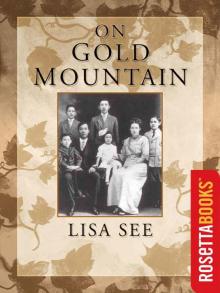 On Gold Mountain: The One-Hundred-Year Odyssey of My Chinese-American Family
On Gold Mountain: The One-Hundred-Year Odyssey of My Chinese-American Family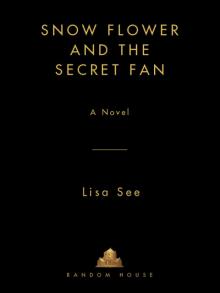 Snow Flower and the Secret Fan
Snow Flower and the Secret Fan Peony in Love
Peony in Love Flower Net
Flower Net Dragon Bones
Dragon Bones Shanghai Girls
Shanghai Girls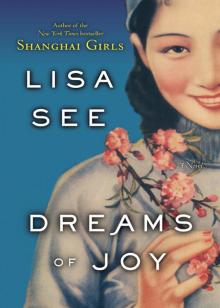 Dreams of Joy
Dreams of Joy The Island of Sea Women
The Island of Sea Women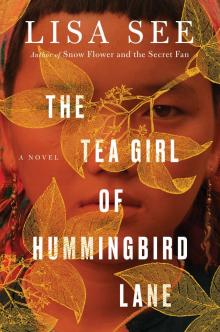 The Tea Girl of Hummingbird Lane
The Tea Girl of Hummingbird Lane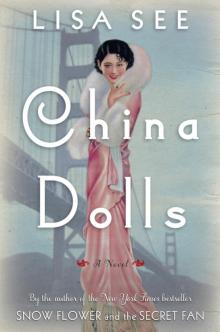 China Dolls
China Dolls The Interior
The Interior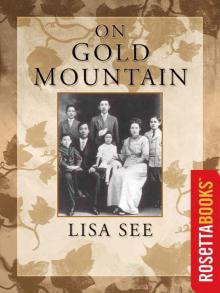 On Gold Mountain
On Gold Mountain